Diplomacy & Diversity
Paloma González BA ’04 works to diversify the U.S. Foreign Service at home and abroad.
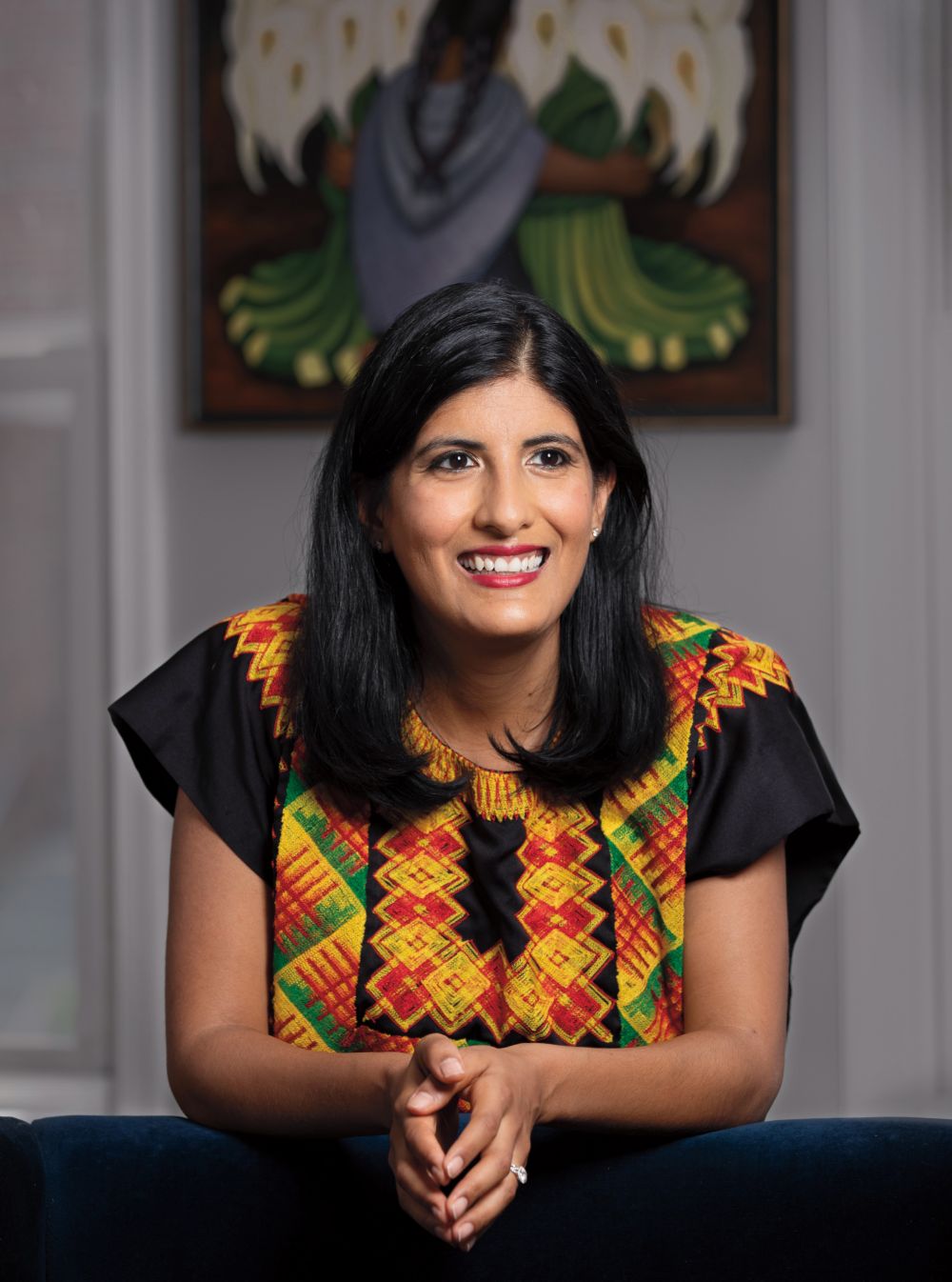
by Romel Hernandez
When Paloma González BA ’04 embarked on a seven-hour car ride to a remote village in the Brazilian countryside, she wasn’t necessarily expecting that a chance meeting with a farmer would wind up affirming her career choice as a U.S. diplomat.
Paloma González BA ’04
U.S. Foreign Service Officer
Education
- BA (International Affairs), Lewis & Clark College, 2004
- MS (Foreign Service), Georgetown University, 2008
- State Department Postings Abroad
- Bogota, Colombia, 2009–11
- Tijuana, Mexico, 2011–13
- Recife, Brazil, 2014–17
- Bucharest, Romania, 2021–
State Department Roles in Washington, D.C.
- Staff Assistant, Assistant Secretary for Western Hemisphere Affairs, 2013–14
- Pearson Fellow 2017–18
- Haiti Program Officer, 2018–19
- Colombia Program Officer, 2019–20
Honors
- Latino National Security & Foreign Policy Next Generation Leader
- “40 Under 40” Latinos in Foreign Policy
Foreign Languages
Spanish, French, Portuguese, and Romanian
González was making the trip in her capacity as the political and economic chief for the U.S. Consulate in Recife. She was visiting an agricultural co-op that had benefited from U.S. foreign aid to help market pink peppercorns overseas, vastly improving the livelihoods of impoverished farming families in the region.
At one point during the visit, a farmer put out his arm and commented on their similar skin tones. She recalls, “The first thing he said to me was, ‘How can you be a U.S. diplomat? You look exactly like me!’”
Making connections between diversity and diplomacy has been a hallmark of González’s 12-year stint as a diplomat, which has taken her to far-flung posts in Colombia, Mexico, Brazil, and now Romania. She says her experience as the child of Mexican immigrants and a woman of color makes her uniquely sensitive to the plight of communities she encounters in her travels with the Foreign Service.
“As a Foreign Service officer, your presence makes an impact. It really lifts people up,” she says. “By supporting marginalized communities, which in some cases have been forgotten by their own governments, you are able to foster the success and stability of those countries. I believe our work leads to a more prosperous and democratic world.”
Her commitment to diversity also extends to her work inside the State Department, where she has taken a leadership role in the Hispanic Employee Council of Foreign Affairs Agencies. The nonprofit, which is a chartered employee affinity group with the federal government, works to promote the recruitment, retention, and career advancement of Hispanics. The State Department has struggled for decades to increase diversity in the ranks of its diplomatic corps; Hispanics/Latinos comprise just 7 percent of Foreign Service employees but nearly 20 percent of the U.S. population.
“It’s going to take time to change the diversity numbers, especially at the top,” she says. “We need to be able to leverage our own country’s diversity as an asset to promote foreign policy abroad.” Francisco Palmieri, who mentored González when he served as an acting assistant secretary of state, says she “stands out as someone with a deep passion for inclusion and diversity.”
“Paloma has been outspoken about the real lack of Hispanics, especially Hispanic women, in the senior ranks,” says Palmieri, currently a senior civilian officer with the U.S. Southern Command. “As a leader in the department, she is always out there mentoring and reaching out to younger up-and-comers.”
“The first thing he said to me was, ‘How can you be a U.S. diplomat? You look exactly like me!’ ”
Her track record has already earned her accolades, including a prestigious Pearson Fellowship, which led to her advisory role on the U.S. Senate’s Foreign Relations Committee. She’s also been recognized as a Latino National Security & Foreign Policy Next Generation Leader by the New America Foundation and included in “40 Under 40: Latinos in Foreign Policy” by the Huffington Post.
☛ ☛ ☛
González traces her roots in political and social activism to her family. As college students in Mexico City in 1968, her parents participated in massive antigovernment demonstrations. The Mexican government at the time violently suppressed the student movement, with troops massacring hundreds of protesters in the capital—a tragedy that got her parents thinking about moving north to the United States.
“There were lots of different reasons they emigrated, but they were part of a generation in Mexico that saw something to tap into in the civil rights movement in the U.S.,” González says. Her parents ended up moving to California in the 1970s, moving around frequently as they struggled to raise a family.
González, the third of five children, grew up speaking Spanish and was homeschooled by her mother before attending high school in San Diego. She was unsure she wanted to go to college, but her debate team coach and a family mentor encouraged her to apply. Lewis & Clark was her first and only choice.
“I loved Lewis & Clark—I was in awe of the caliber of professors and the amazing international affairs department,” she says. “The best thing was being around so many people who were curious about the world and were thinking about ways to make the world a better place.”
González excelled at Lewis & Clark, majoring in international affairs and participating in the college’s nationally recognized speech and debate team under L&C’s longtime forensics coach, the late Steve Hunt. She was also a Pamplin Fellow and a member of Phi Beta Kappa.
Diplomacy & Diversity
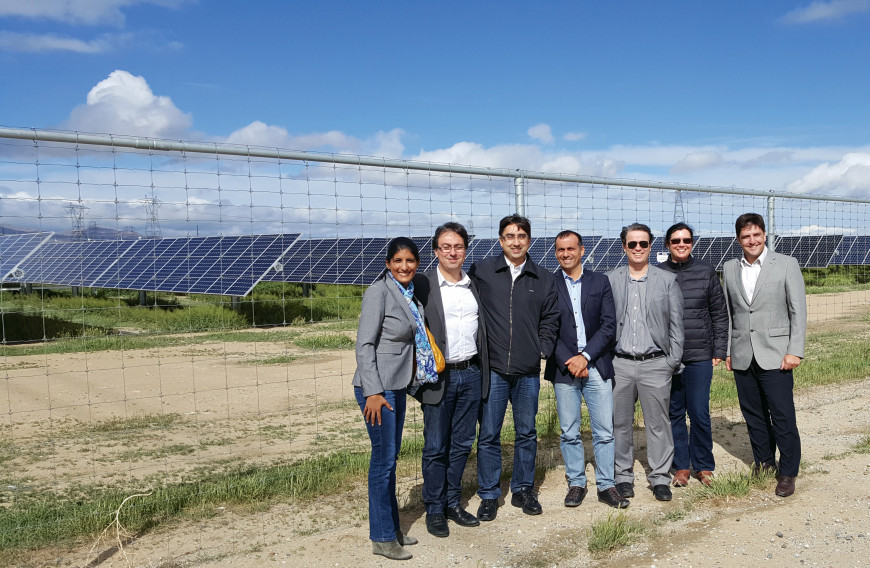
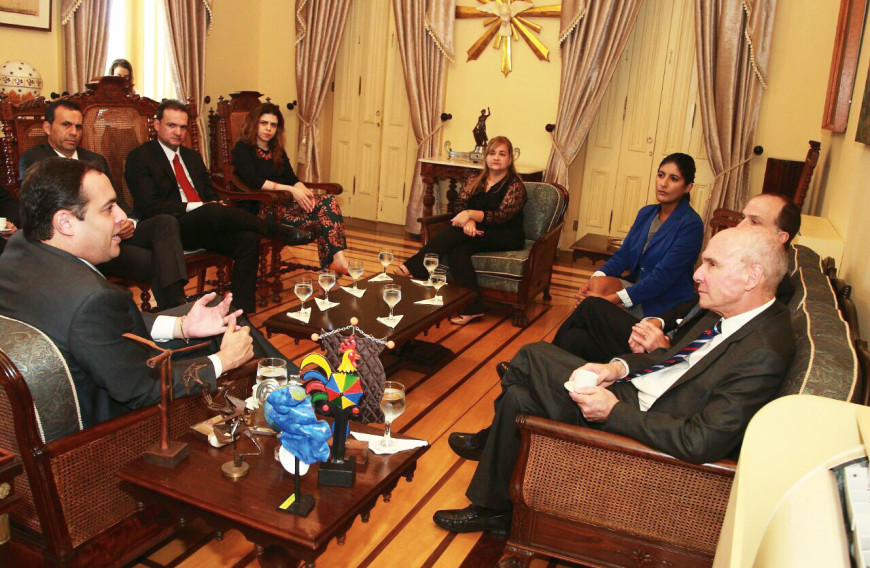
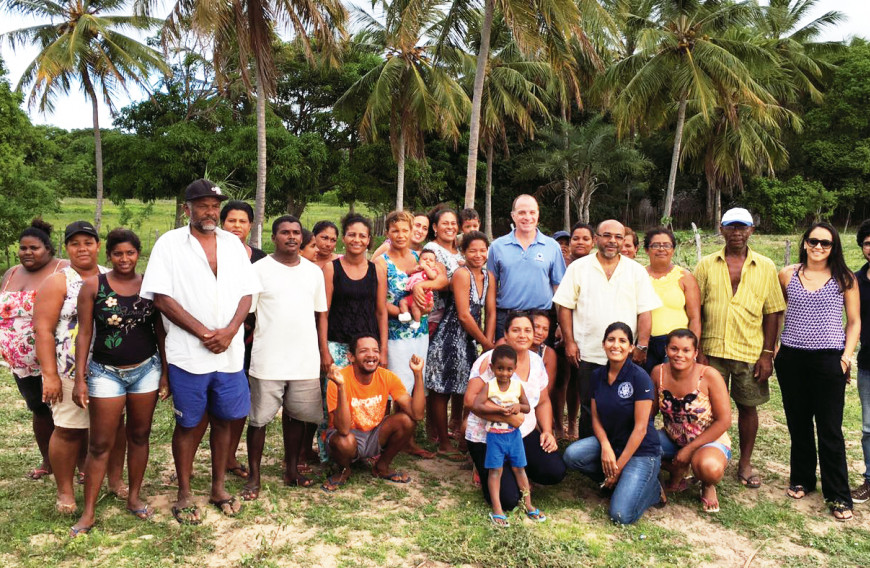
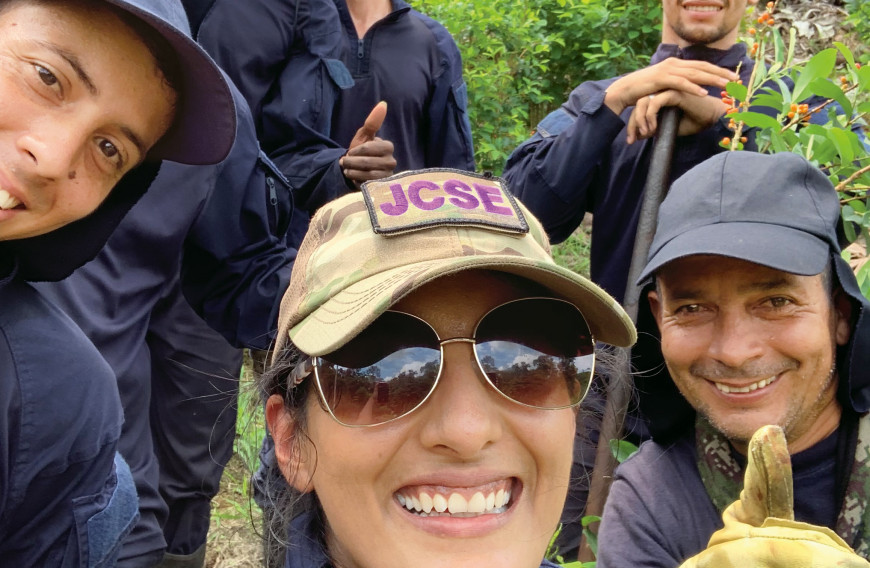
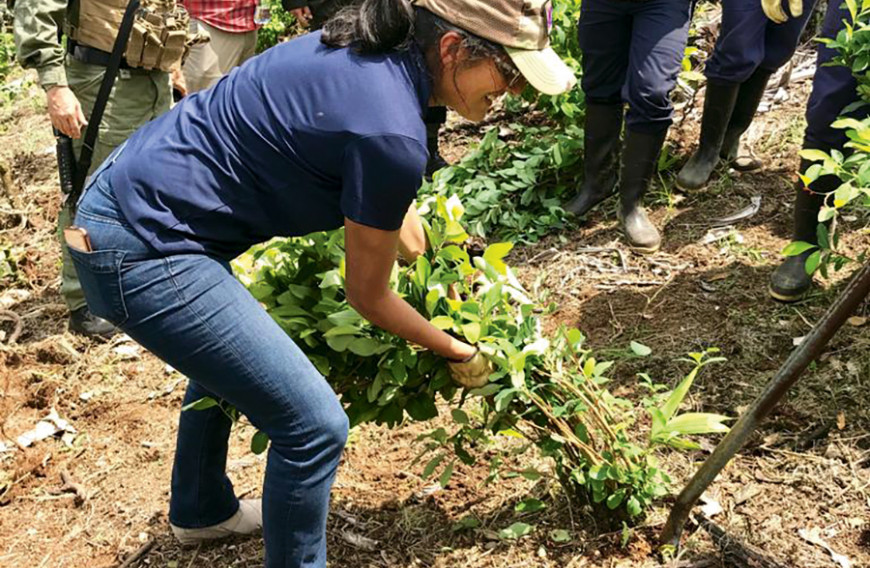
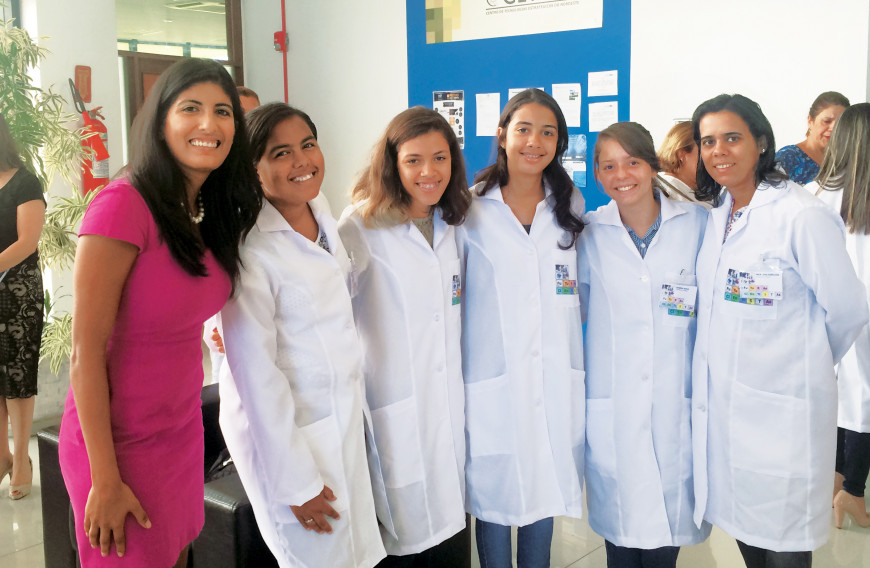
Cyrus Partovi BA ’67, retired senior lecturer in social sciences, remembers her well and has followed her career from a distance. “Her presence in my U.S. foreign policy course raised the level of discourse,” he says. “I always knew she would put Lewis & Clark on the map.”
Although Oregon lacked the diversity of her native California, she saw the college’s overseas study programs as an opportunity to “discover the world.” She participated in two programs: one in France and the other in Cuba. Both experiences, she says, were pivotal in her decision to join the Foreign Service.
González’s first trip, to Strasbourg, France, where she interned with the European Parliament, coincided with the U.S. invasion of Iraq in 2003. She found herself facing a wave of anti-American sentiment that gave her a deeper understanding of what it meant to be an American.
“I had always looked critically at U.S. foreign policy, what we were doing wrong and what we could be doing better,” she says. “Even though I didn’t agree with the war, when you’re overseas and everyone’s putting your country down, your patriotism really kicks in.”
As a senior, González spent a semester studying in Havana, where she got a glimpse behind the curtain of the Cuban government’s revolutionary propaganda. The kicker was joining a massive crowd witnessing Fidel Castro bluster for two hours in a speech marking May Day.
“It seemed delusional and disconnected from the everyday struggles of Cubans who didn’t have enough to eat,” she says. “I feel I got to see the beauty of the country, but also such frustration and sadness and oppression, especially among the younger generation.”
Professor of History Elliott Young, who led the trip to Cuba, remembers González as an engaging and sophisticated student with the ability to “critically analyze information and make up her own mind about things.” He adds, “I’m not surprised she’s developed her career in the Foreign Service—she has the intellect and temperament to go far in that job.”
☛ ☛ ☛
After graduating from Lewis & Clark, González returned home to San Diego to work for a nonprofit focused on fostering the college aspirations of low-income students. She went on to pursue a master’s degree at Georgetown University with the help of a Rangel Graduate Fellowship, a coveted award designed to diversify the ranks of the Foreign Service.
Joining the Foreign Service in 2009, González’s first international position was serving as a political and consular officer in Bogota, Colombia. She worked on outreach to the country’s Afrodescendant and indigenous populations, work that culminated in the signing of a joint U.S.-Colombia Action Plan on Racial and Ethnic Equality. She is particularly proud of the plan’s provisions to expand support for Afro-Colombian teachers and students. She also worked on U.S.-backed efforts to remove land mines in the countryside and to extradite drug dealers, projects that directly benefited local communities and U.S. foreign policy interests.
She was visiting the poorest state in Colombia when an Afro-Colombian university official told her how proud he was to see “his” president—President Barack Obama—take office, another indication, she says, of the United States setting an example for the world.
“It can be hard to quantify the results of your work, especially when you’re only in a country for a few years,” she says. “But I can tell you from experience that the United States sets a powerful example abroad.”
Following Colombia, González worked for the State Department in Mexico and Washington, D.C., before once again going overseas, this time to Brazil. Among her accomplishments was cultivating international public-private partnerships to expand renewable energy projects, including an initiative to reduce carbon emissions and support sustainable development on the archipelago of Fernando de Noronha in northeast Brazil.
“By supporting marginalized communities, which in some cases have been forgotten by their own governments, you are able to foster the success and stability of those countries.”
González has spent the past four years back in Washington, D.C., as a foreign policy officer for the Senate Foreign Relations Committee and as a program officer for Haiti and Colombia, overseeing programs for the Bureau of International Narcotics and Law Enforcement Affairs.
She was formally hired for the Romania job a year ago, but the COVID pandemic and the birth of her first child delayed the move until this past August. She sought the job as deputy political counselor with the U.S. Embassy in the capital of Bucharest, in part, because she wanted to broaden her work experience beyond her primary expertise in the Americas.
She admits, “Working in Europe is going to be outside my wheelhouse, which makes it very exciting.”
To prepare for the job she was required to undergo six months of intensive training in the Romanian language, along with a deep dive into the country’s history, culture, and, of course, politics. Romania is one of America’s important strategic partners in Central and Eastern Europe. As a developing democracy, it’s actually quite similar to some of the countries she’s worked in before; its problems of widespread corruption and poverty are familiar to her.
“This is what I was hired and trained to do,” she says. “As a Foreign Service officer, I am constantly reinventing myself and building on my past experiences and skills.”
While González is still settling into Romania, her mentor Palmieri, who has worked at the State Department since the 1980s, says she has an extremely bright future in diplomacy.
“She’s established herself [in the Americas], so going to Europe is a great move,” Palmieri says. “In 5 to 10 years, she’s going to be ready to be an ambassador. Paloma’s on the fast track.”
Romel Hernandez is a freelance writer in Portland.
Editor’s note: Paloma González participated in interviews for this article in a personal capacity. The views expressed are her own and not necessarily those of the U.S. government.
More L&C Magazine Stories
Lewis & Clark Magazine is located in McAfee on the Undergraduate Campus.
MSC: 19
email magazine@lclark.edu
voice 503-768-7970
fax 503-768-7969
The L&C Magazine staff welcomes letters and emails from readers about topics covered in the magazine. Correspondence must include your name and location and may be edited.
Lewis & Clark Magazine
Lewis & Clark
615 S. Palatine Hill Road MSC 19
Portland OR 97219

